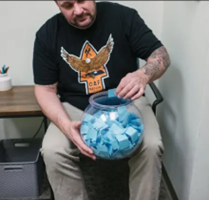Substance Use Resources to Reduce Drug-Related Harm Among People Experiencing Homelessness
Substance use and homelessness: A high proportion of adults experiencing homelessness have experienced significant trauma and sometimes experience high levels of both mental health distress and substance use. In California, an estimated 35% of adults experiencing homelessness report regular use of drugs (cocaine, amphetamines, or opioids). Unfortunately, homelessness can limit access to substance use resources, harm reduction supplies, and treatment.
Naloxone rescue kits: People experiencing homelessness are much more likely to use drugs alone. Please see above to access naloxone rescue kits.
Never use alone! If you do, call the confidential national overdose prevention lifeline at 800-484-3731. They stay on the phone with you, give harm reduction and overdose prevention info, and call EMS if you overdose. It could save your life.
Medication-assisted treatment (MAT): Medication-Assisted Treatment (MAT) and Medications for Opioid Use Disorder (MOUD) refer to medications used to support full recovery from opioids and alcohol. These medications stabilize abnormal brain chemistry caused by substance use and that lead to relapse. Used in combination with counseling and behavioral therapies, they help relieve withdrawal and cravings and help end dependence on drugs. Examples of these medications include "bupe" (buprenorphine), methadone, and naltrexone. Increasingly, MAT is offered to patients in the following places:
- Primary care clinics: Ask your primary care provider for MAT access or check with ACHCH for primary care access.
- Street Health teams: Unsheltered people can access MAT through their Street Health teams.
- AHS Bridge Clinic: Easy-to-access MAT services at Highland Hospital; contact SUN@alamedahealthsystem.org or text/phone (510) 545-2765.
- Alameda County Behavioral Health: Call (844) 682-7215 or visit www.acbhcs.org/substance-use-treatment/ to access a range of substance use providers in Alameda County.
- Cherry Hill Detox: 24/7 withdrawal support is available at (866) 866-7496.
 Contingency management for methamphetamine/stimulant use: Contingency management is one of the few evidence-based approaches to ending stimulant dependency. Alameda County Health Care for the Homeless is piloting contingency management services in partnership with shelter and housing providers. For more information, reach out to ACHCH at (510) 891-8950 or achch@acgov.org. Alameda County Behavioral Health (ACBH) is piloting a contingency management program (called Recovery Incentives) at La Familia, Horizon Services (Project Eden & Project Eden East County), and HealthRight360. For more information, please contact ACBH at (800) 491-9099 or www.acbhcs.org.
Contingency management for methamphetamine/stimulant use: Contingency management is one of the few evidence-based approaches to ending stimulant dependency. Alameda County Health Care for the Homeless is piloting contingency management services in partnership with shelter and housing providers. For more information, reach out to ACHCH at (510) 891-8950 or achch@acgov.org. Alameda County Behavioral Health (ACBH) is piloting a contingency management program (called Recovery Incentives) at La Familia, Horizon Services (Project Eden & Project Eden East County), and HealthRight360. For more information, please contact ACBH at (800) 491-9099 or www.acbhcs.org.
Harm reduction: The goal of community-based harm reduction is to provide people who use drugs and their loved ones with the knowledge and supplies that they need to keep themselves healthy and alive in their substance use. Syringe service sites provide clean works, information and resources, health care service and supplies needed by people who use drugs to reduce infection and harm, and always distribute naloxone/Narcan rescue kits. Harm rduction information schedule or map.
Drug checking: People who use drugs need to know what is in their drugs so they can take the steps to save lives and prevent harm. East Bay Drug Checking rolled out drug checking services at countywide syringe services sites in the summer of 2023 with support of Alameda County and the ACHCH program. Learn more at www.heppac.org